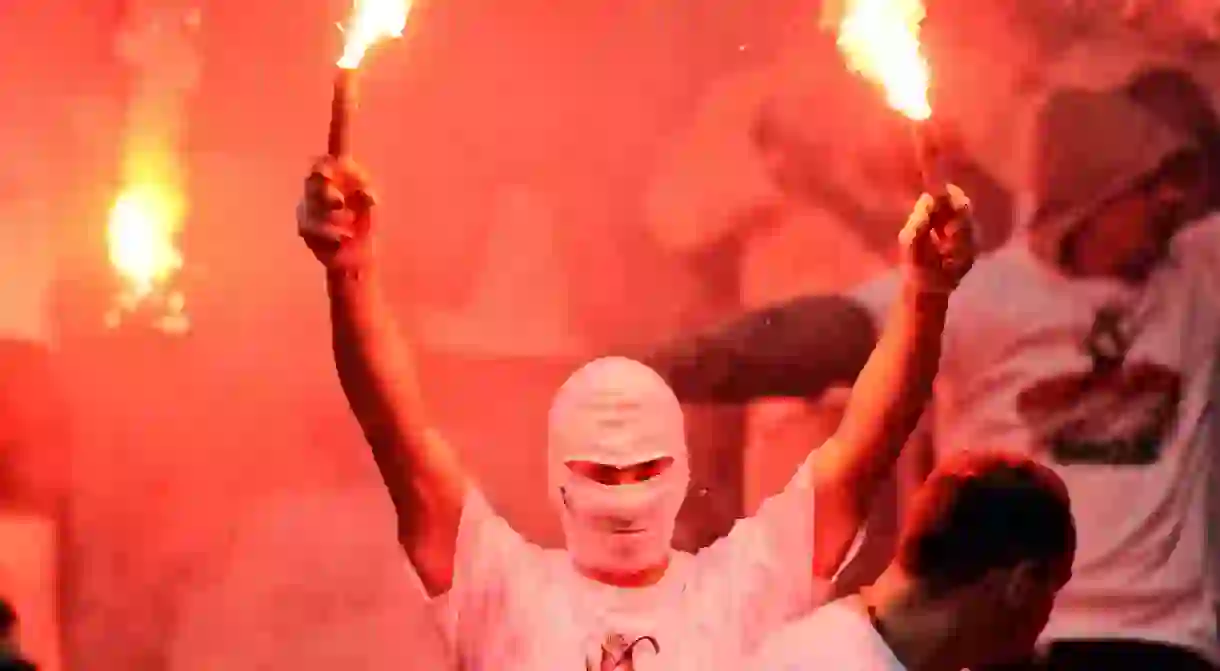How Russia Is Legalizing Soccer Hooliganism

Rather than distancing themselves from Russian soccer’s association with hooliganism, some government officials are embracing the violence as something to be celebrated, and have put forward ideas to turn it into an official sport – draka.
The proposal of draka
Igor Lebedev, a member of the opposition Liberal Democratic Party of Russia, has drawn up rules for draka. The proposed sport, named after the Russian word for fight, would involve 20 unarmed competitors on each side taking part in an organised fight. The proposal can be read on the party’s official site; it explains: ‘Russia would be a pioneer in a new sport. Fans arrive, for example, and start picking fights. And they get the answer – challenge accepted. A meeting in a stadium at a set time.’
Lebedev, who is also on the board of the Russian Football Union, was openly supportive of Russian football fans after they clashed with England fans during Euro 2016, tweeting: ‘I don’t see anything wrong with the fans fighting. Quite the opposite, well done lads, keep it up!’ Vladimir Markin, a media spokesperson for the police and Russian Investigative Committee, said French police were more used to policing Gay Pride and couldn’t handle ‘real men’.

The clashes between Russian and English fans in Marseille left more that 100 England fans injured. In terms of numbers involved, injuries and breakdown in law and order, it was the worst ever incident involving England fans.
For Russia, who will be hosting the World Cup in 2018 – off the back of a campaign that promoted a happy and harmonious Russia – the rise of hooliganism within soccer fans has been on the increase for decades. The brawling in the streets of Marseille has brought to the public’s consciousness something that has been developing steadily and with increasing sophistication.
British influence
With the fall of Communism leaving Soviets seeking cultural inspiration from the West, aspects of food, fashion and music were at the forefront, but a darker side of soccer was cherry-picked from British shores. The Russian hooligan groups of today grew up idolising the British hooligans of the 1980s and 90s, replicating everything from their behaviour, right down to how they dressed. When various English club firms came together as one for England matches abroad, Russians saw it as a fascistic honour to go into battle with them. The hooliganism today, however, is far removed from the English casuals of 30 years ago.
In 2000, in an attempt to control hooliganism, Russian MPs created the All-Russian Fans Association (ARFA), a state-backed body that was supposed to bring supporter groups together in a more controlled, harmonious way. The ARFA could then follow the Russian national team together in an organised fashion. Whether its intentions were ever truly credible is hard to believe (its leader, appointed by Vladimir Putin, was Alexander Shprygin, who has an extensive history associated with far-right groups), but by 2016 hooligans had infiltrated the group and were prominent in the France fights. It has since, unsurprisingly, been shut down.
New breed of hooligan
The closure of the ARFA comes as part of a crackdown ahead of 2018, but there is a sense that a problem that has been 30 years in the making cannot be fixed in one fell swoop. This is a new era of hooliganism. Putin has helped promote the image of the Russian man, one based around patriotism, health and combat sports, and their fighters are deemed to be a representation of character, willpower and strength. This is now a world of the sober and the organised, with training camps, recruitment and fitness regimes, and a precise Russian identity. This is not drunk louts who have spent too much time in the sun.
France saw rules of engagement. Russian fans moved in packs, attacking and retreating as a unit. Across Russia today, hooligan groups hold ‘forest fights’ – auditions for potential recruits, where they can gain membership after fighting contemporaries in rival firms. Impress established members enough and recruits win acceptance, with firm t-shirts and pin badges to fill the gap until tattoos are inked further down the line.
A combat sport associated with soccer isn’t completely out of the question. Calcio Storico, or Historic Football, is the brutal form of soccer played out in Florence, Italy, every summer. It dates back to the 14th century and features rival quarters of the city competing against each other in what appears to be NFL-meets-MMA. That said, there is a huge difference to be made between a medieval tradition that is part of the pageantry of a city, to the attempted legitimisation of a criminal problem.
Putin’s claims that the World Cup next year will be safe, friendly and welcoming are totally at odds with Lebedev’s proposals. The Russian president may not openly agree with Lebedev, but the cultural image of the Russian man that he has been keen to promote during his time as leader, has only helped legitimise the problem. Draka may seem far-fetched for some, but there are plenty in Russia who have been playing the game for some time now, and who are eager to be respected for it on the global stage.













